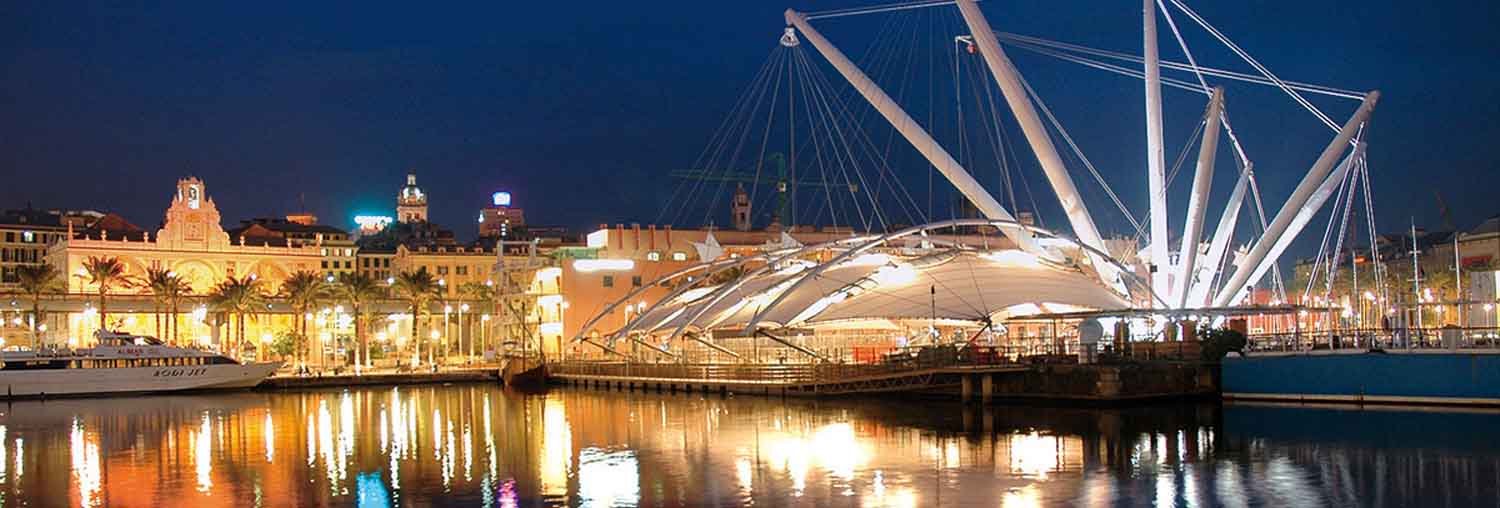Come arrivare:
By Train: Genoa is home to a unique branch of the railway network, unwinding over East-West routes and inland tracks that connect to Northern Europe.
The city’s central stations are Genova Piazza Principe – Piazza Acquaverde 4 (the main departure/arrival point to and from the North and West) and Genova Brignole – Piazza Verdi 1 (the main departure/arrival point for connections to the East and South). Travelling by train is undoubtedly one of the most convenient ways to move around the city (on the line connecting the neighbourhoods along the coast, from Voltri to Nervi).
By Car: Four motorways connect the city to the national network at different points.
- A12 Genova – Rosignano: in the East, GE Nervi and GE Est exits;
- A10 dei Fiori Genova – Ventimiglia: in the West, GE Voltri, GE Pegli, GE Aeroporto, and GE Ovest exits;
- A26 Voltri – Gravellona: connecting to the A10 at GE Voltri;
- A7 Serravalle Genova – Milano: GE Bolzaneto and GE Ovest exits.
By Ship: Genoa’s Ferry Terminals for cruise ship traffic, Ponte dei Mille and Ponte Andrea Doria, are located just a few minutes from both the Genova Piazza Principe railway station and the Old Port, the city’s main tourist area, nestling within the historic centre.
The Passenger Port of Genoa comprises a total of 15 berths, five Passenger Terminals, three of which are used for ferry traffic – the Calata Chiappella, Ponte Caracciolo, and Ponte Colombo Terminals – and the two ferry terminals mentioned above, reserved for cruise ships.
At the Ferry Terminal, ships arrive from and depart for the main ports of the Mediterranean: Olbia, Porto Torres, Palermo, Barcelona, Corsica, Tunis and Tangier.
By Plane : Cristoforo Colombo Airport is the fastest way to reach Genoa, as well as the most spectacular, since the runway is almost entirely surrounded by the sea. Landing in Genoa, flying over the promontory of Portofino welcomes you with an unforgettable view of the city!
The airport is located in Genoa’s Sestri Ponente neighbourhood, a few kilometres from the city centre, to which it is connected by public transport (Volabus , the I24 line), taxis and trains.
The country’s official currency is the Euro.
Automated currency exchange machines can be found at the airport and within major banks.
Credit cards are generally accepted in shops and restaurants.
Banks are open Monday through Friday from 8:30 AM to 1:20 PM, with variable hours in the afternoon; some branches are also open on Saturday mornings.
Daylight Saving Time
In the spring (on the last Sunday in March), daylight savings time enters into effect: clocks must be moved forward an hour with respect to solar time, which is later returned to at the beginning of autumn (last Sunday in October).
Electrical current
The electrical current in Italy is supplied at 220 volts. Sockets are designed for plugs with two or three prongs arranged in a row.
Telephones
The international code for calling Italy from abroad is 0039, which must be followed by the local area code of the desired phone number. Cellular phone networks provide coverage throughout the country.
Closing days
On Mondays, most Museums are closed, along with several attractions in the Old Port, many of the city’s restaurants, and the hair salons. Shops and stores are closed only during the morning on Mondays. On Wednesday afternoons, most food shops are closed, with the exception of the supermarkets. The dry cleaners are closed on Saturdays.
Shop hours
Many shops still close midday from 12:30 PM to 3:30 PM, though in the city centre, staying open all day has become very widespread and is a practice that has always observed by the big department stores.
Post Offices
The “Genova Centro” post office, located at Via Dante 4B/r, is open Monday through Friday from 8:00 AM to 6:30 PM and on Saturdays from 8:00 AM to 1:30 PM; it is closed on Sundays.
To view the hours and addresses of other branches, please visit the Poste Italiane website.
Consulates and embassies
At www.esteri.it/MAE/EN you can find information regarding services that the Ministry of Foreign Affairs offers to foreigners and, in particular, to foreign delegations in Italy, for those wishing to travel or move to Italy for tourism, school, or work.



